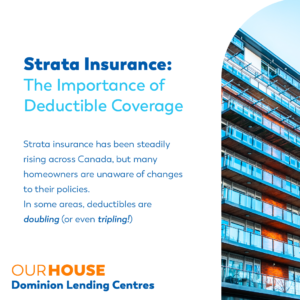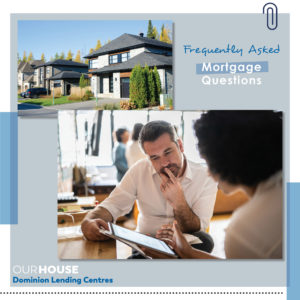
Strata Insurance: The Importance of Deductible Coverage.
Strata insurance has been steadily rising across Canada, but many homeowners are unaware of changes to their policies. In some areas, deductibles are doubling (or even tripling!), which can result in extremely high costs if you are not updating your individual policy.
To ensure that you remain up-to-date with your strata insurance policies, it is vital that homeowners living within a strata building check with their strata management for a copy of the most recent insurance policy. While it is good to check over the entire policy, a few key areas to review are your deductibles and comparing your coverage with your individual homeowner policy to ensure all gaps are filled.
Unfortunately, many homeowners within strata buildings do not realize the importance of having individual coverage. Typically, strata insurance covers the building itself. This means that, in the event of an accident, such as a fire or flood, the building can be re-established. Unfortunately many homeowners think this is enough coverage, but it is equally important to ensure that you have your own individual homeowners insurance policy.
The purpose of an individual policy is to help to protect the contents of your apartment, townhouse or condo in the event of an accident. This means that any upgrades you made to your unit would be covered, as well as your belongings. More importantly, however, is these policies also serve to fill in the cost gap relating to the strata building deductible.
Historically, deductibles in strata managed buildings averaged $25,000. This means that, in the event of an accident (flooding, fire, etc.), you would need to pay $25,000 upfront to have the repairs made. However, as the costs of strata insurance increases across the country, these deductibles are changing.
For many homeowners, there has been no change to the insurance cost or strata fees, leaving them unaware of any adjustments to their policy. Instead, the changes are being made directly to the deductible to cover the increased costs. In fact, in some cases the deductibles are doubling or even tripling, leaving homeowners with a hefty bill in the case of insurance coverage. Instead of having a $25,000 deductible, many homeowners are seeing this increase up to $250,000.
With so many increases to various fees and changes to policies within strata organizations, it has become even more important to maintain vigilance and be aware of any changes to your strata policies. Typically, these are shared with homeowners via meeting minutes and e-mails which every homeowner in a strata building should have access to.
If you receive any updates from your strata management, you must be sure to review them. Always take your strata and individual policy to an insurance agent to ensure you are aware of your coverage and that your individual homeowner’s policy is working in your favor. Investment property owners especially need to check their existing deductible against the updated deductible and insurance policies to avoid any future issues.
- Written by my DLC marketing team and posted by Kristin Woolard









